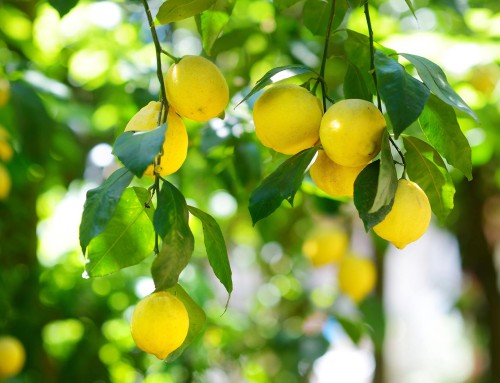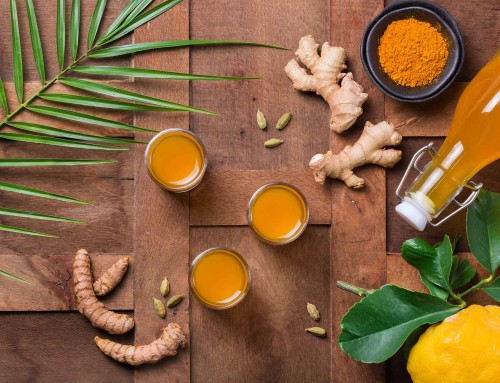Ayurvedic Tips for a Blissful Stress-Free Winter

Staying Blissful All Winter Long By John Peterson, MD
We’ve just passed the Autumn equinox, and as we progress towards the winter solstice we start to look forward to a turning point of the year.
In the northern hemisphere, the relentless shortening of the days reverses and then it is the night’s turn to diminish. The return of the light comes quietly, in a silence you can hear outside at night when snow is falling, each flake absorbing its own share of noise. I challenge you to bring this silence into your life. It is balm for the soul.
The winter season is a time of joy, rest, thanksgiving and sharing. One of the greatest gifts you can give to family and co-workers is your own health. The Ayurvedic definition of health is living 24 hours a day with the body, mind and senses full of bliss. This means having balanced doshas, balanced digestion, balanced elimination and a getting a good night’s sleep every night!
Autumn when the winds of Vata blow the leaves off the trees. Vata continues to blow on us for the next two months and can create whirlwinds of “unnecessary” thoughts, fears, anxieties and sleepless nights.
Prana Vata and Apana Vata can become easily aggravated. When Prana Vata is out of balance you feel tired in the afternoon and can find yourself holding your breath or breathing shallowly. And when Apana Vata is out of balance you can feel ungrounded and have irregular digestion and elimination.
Balance in all areas is important. High levels of unmet expectations for the winter season feed into the winter blues or “seasonal affective disorder,” with the associated feelings of doubt, disappointment and rejection – the three seeds of disease, from the perspective of Maharishi AyurVeda.
Here’s my Top Ten List of Ayurvedic recommendations to nourish the heart, eliminate toxins and soothe the mind during the winter season.

1. Practice the Transcendental Meditation® program regularly
Your mind will gently settle into that silence that nourishes your spirit, all your senses and every cell in your body. If you aren’t yet practising this effortless mental technique, give yourself the gift of learning it as the new year proceeds. (Check out www.tm.org for more information.) The class only takes two hours a day for four days in a row and gives you a lifetime ticket to reduce stress, good for a twenty-minute holiday twice a day.

2. Follow a regular daily routine
Follow a regular daily routine that includes a good night’s sleep and eating your main meal in the middle of the day. Vata dosha is irregular by nature and is soothed by a consistent daily routine. Go to bed before 10 am. If you have trouble falling asleep at night, drink a cup of Good Night Tea and take a Blissful Sleep tablet an hour before bedtime. If you often wake up in the middle of the night, take a Blissful Sleep – Vata & Pitta tablet an hour before bedtime, along with a cup of warm milk containing a teaspoon of our Organic Rose Water.

3. Stay calm and warm
Sip on Organic Vata Tea or Peace of Mind Tea, to calm the mind and keep you hydrated and warm during Vata Season. Consider taking 1-2 tablets of Peace of Mind after lunch and supper.

4. Avoid overeating
This means learning to pay attention to the signals your body gives you. Put your hands over your stomach to see if you are hungry for food. Hunger indicates that your body is ready to take in food. If you’re not hungry, don’t eat. Sit down for your meals and take a moment of silent appreciation for the food, the cook, your digestion and the silent source of it all. Enjoying food with all your senses prepares the digestive fires (agnis) to process that meal more efficiently. If you don’t distract yourself from the meal by reading, watching television or working, then you will notice when you feel satisfied. Not stuffed, just satisfied. The Ayurvedic texts say we should eat to about 75% of our capacity. This is about what would fit into your two cupped hands.

5. Protect your digestive agnis
Avoid heavy, deep-fried, cold or frozen foods. You can take Herbal Digest before lunch and supper, to help balance your digestion and elimination. It also helps promote appetite and balance cravings. The result is that your food is more satisfying and nutritious, and you feel lighter and more comfortable after meals. The ingredients in Herbal Digest include all six tastes, each of which stimulates a different aspect of digestion and metabolism. Herbal Digest includes cane sugar, caraway, cumin, long pepper, ginger, cardamom, cinnamon, black salt, hing, lime and pomegranate seeds. These are all processed in the traditional way to preserve the inner intelligence of the plants. Pomegranate seeds help balance both the appetite and the process of digestion.

6. Follow the traditional Ayurvedic Behavioural Rasayanas
Which are behaviours that are considered to help nourish your body, mind and spirit. Especially spend time with children and the elderly. If you have children or grandchildren, enjoy them! More here

7. Daily exercise helps refresh body, mind and spirit
Daily exercise helps refresh body, mind and spirit. Exercising at least half an hour a day not only helps keep the extra pounds off but will improve your agnis and reduce ama. Whatever you enjoy, whether walking, swimming, dancing, or football, include it as a regular part of your routine. Ideally, exercise during Kapha time of the morning, before 10 am.

8. Bundle up!
Protect yourself from the elements, especially the head, neck and shoulders. If it’s really cold outside, breathe through a facemask or scarf, so the air that enters your lungs is warmer and moister.

9. Follow your heart
This is an ancient Ayurvedic prescription for those who feel unfulfilled. Take time each day to check in with your heart. You can close your eyes and place your hands over your heart and ask yourself, “What do I need?” If the holiday season brings sadness to you, then nourish your heart with our Blissful Joy or Stress-Free Emotions.

10. Be with the stars at night
One particular Vedic text declares that the entire universe is contained inside your heart, in a space the size of your thumb. When the boundaries of our life get us down, looking at the stars re-connects us with the universe and reminds us of our inner cosmic nature. The very act of looking up is uplifting. You raise your chin and chest, allowing the rib cage to open and the lungs to expand. Stargazing can ignite hope, dreams and a sense of wonder.

Underneath all of the winter activities remember, the end of the year and the beginning of another is a time to be grateful, to attend the inner light, to look up to the stars and to desire peace for the world.
I’d like to close with a wonderful story my wife tells about the first time she studied Maharishi AyurVeda in India. It was the full moon in the middle of the summer (nice thought!) and Maharishi had gathered everybody into his garden for a group meditation by moonlight. The silence continued, my wife says, long after she opened her eyes at the end of the meditation. And in that silence, the great Maharishi of medicinal herbs, Balraj Maharishi, who rarely spoke, took the microphone.
He said that the silence of the group meditation reminded him of a time in deep meditation when the king of all the medicinal plants, the Soma Plant, came to tell him that all the medicinal plants of world were eager to help Maharishi create world peace. It gives me peace as a doctor to know that when I prescribe a Maharishi AyurVeda product, I’m really prescribing the intelligence of the plants, along with age-old wisdom of how to utilise them that comes from Vedic sages. All the medicinal plants that are used in Maharishi AyurVeda Product’s formulations are planted, grown, harvested and processed in the traditional way, which protects the intelligence of those plants and helps promote peace in our mind and body and in the world. So next time you enjoy a Maharishi AyurVeda herbal product, send a quiet thanks out to the plants whose intelligence you are taking in.
Have a wonderful winter!
Classic Ayurvedic Rice Pudding
by Domnick Mason, Chef at The Raj

Rice pudding is an ancient dish enjoyed by many cultures throughout history. It is perfect for the cold season, delicious, and is associated with good nutrition, easy digestion and satisfaction.
It is also famous as a balancing food – it was mentioned in ayurvedic medical texts before it was mentioned in cookbooks.
Rice pudding is known for its deep Vata-pacifying qualities. The warmth and sweetness of the rice, along with the density of the milk, fruit and rice blend, combat the cold and airy dryness of winter weather. Rice pudding helps to promote balanced health while being a pleasure to the taste buds. The dish is both filling and flavourful. It makes a perfect dessert for the cold winter season.
Cinnamon helps regulate blood sugar and blood pressure and is Vata pacifying because of its both sweet and pungent qualities. Use dehydrated palm sugar from the coconut palm tree that contains 17 amino acids and is low-glycaemic.
Ingredients
- 1:6 parts organic rice: organic whole milk
- 1-2 handfuls of organic raisins or Medjool dates, whichever you prefer
- 2 whole organic cinnamon sticks
- 1 tsp. freshly-ground organic cardamom seeds
- 1 tsp. organic ghee
- 2-3 parts organic coconut sugar
Directions
- Rinse and wash the rice and place in an open pot with the milk.
- Cook at a low simmer (it’s OK that some of the milk evaporates), stirring occasionally.
- Add whole spices – cinnamon sticks and ground cardamom.
- When the pudding is half-cooked, after about 15 minutes, add the raisins or dates.
- In the last 5 minutes, add sweetener and ghee, slowly and according to personal taste.
- The rice pudding should be thick and creamy and cook for approximately 30 – 40 minutes total.
- Serve and enjoy this bone-warming and delightful dish!
DISCLAIMER: The information in this document is presented for the sole purpose of imparting education on Maharishi AyurVeda and neither the information nor the products are intended to diagnose, treat, mitigate, cure or prevent any disease. If you have a medical condition or are pregnant or lactating, please consult a health professional and it is recommended that you speak with your physician before making significant changes to your diet or routine.





